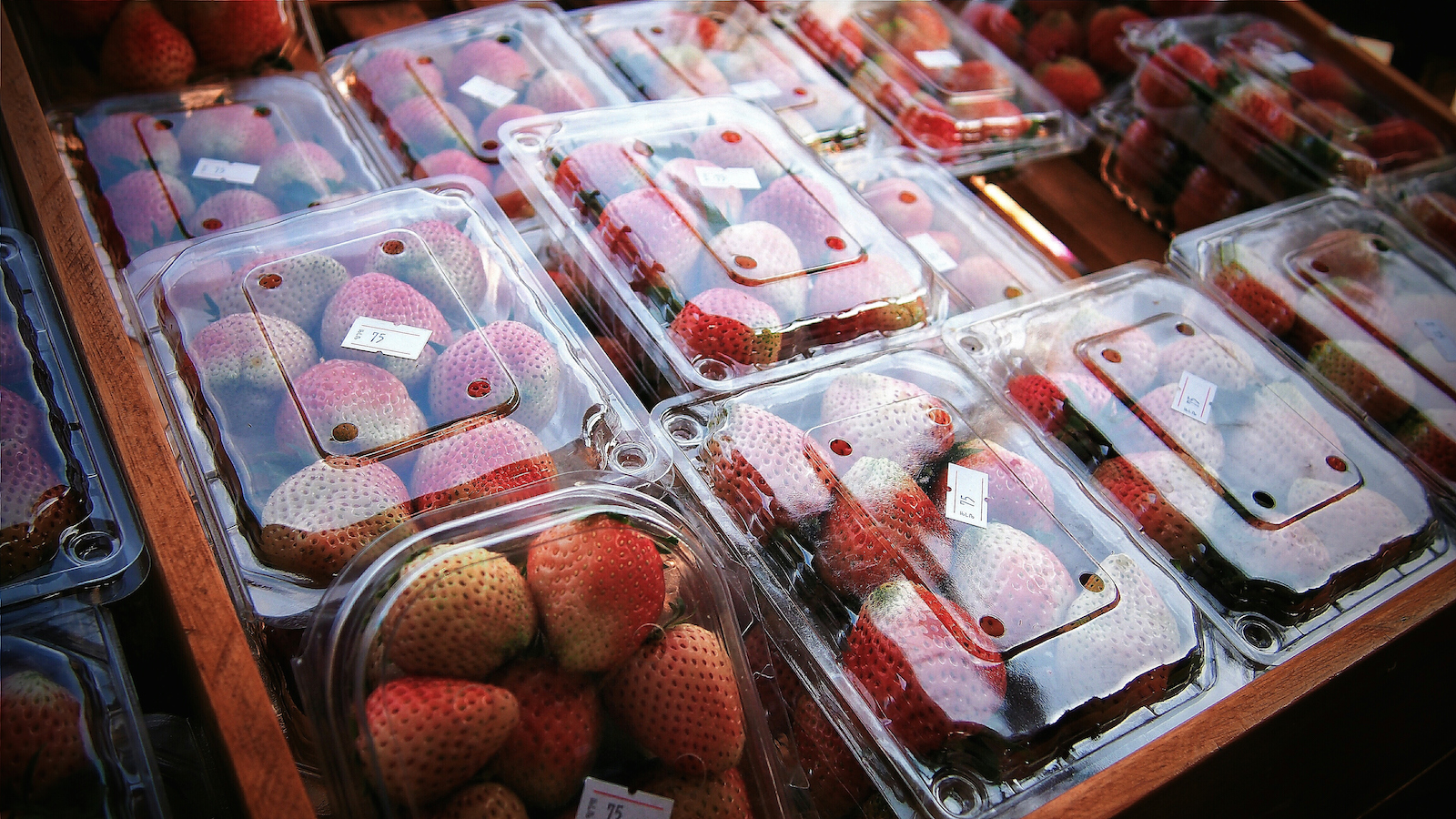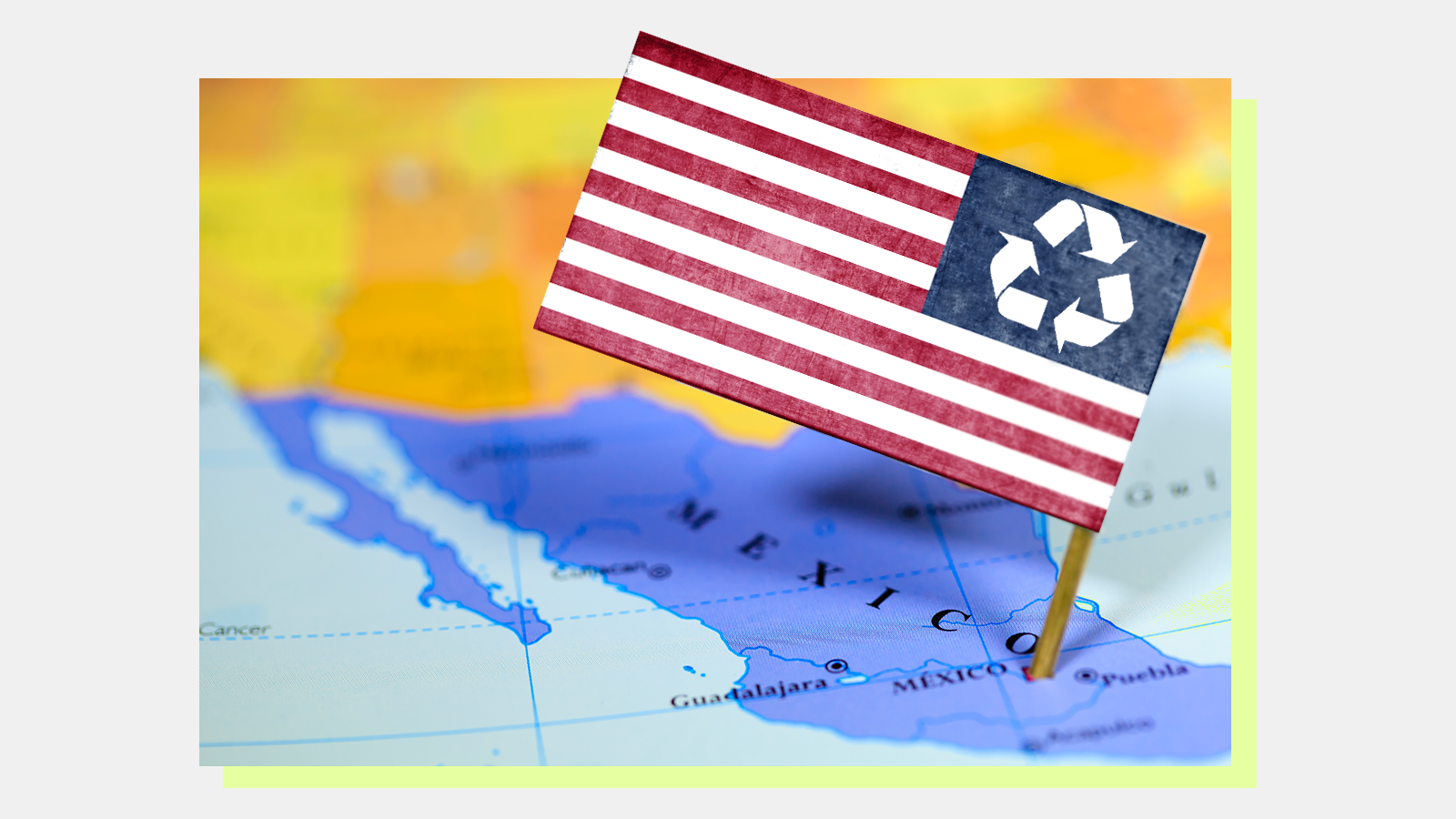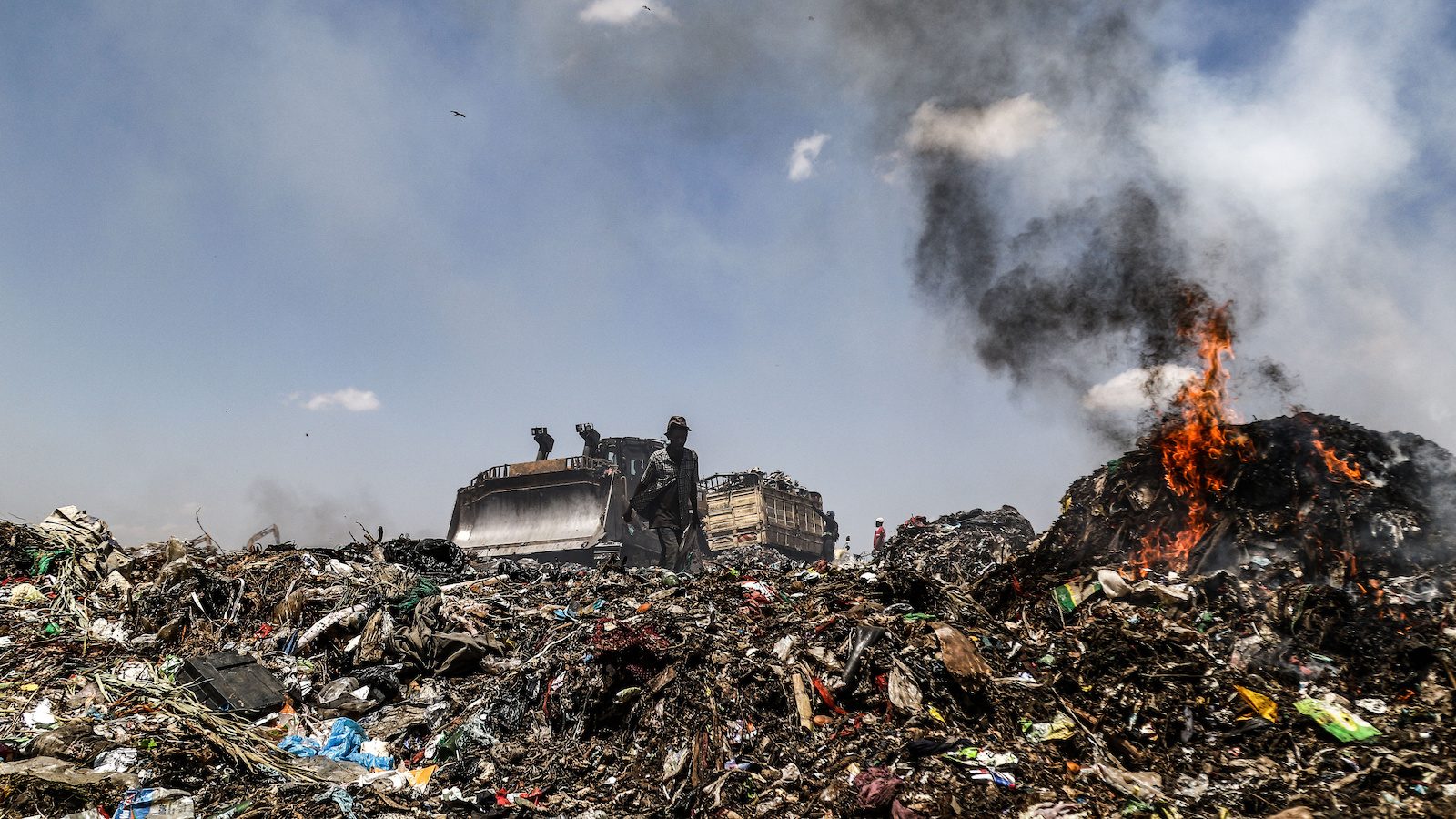Just ahead of this year’s Super Bowl in February, the City of Phoenix, Arizona, published a peculiar press release touting its strategy for waste diversion. Thanks to its relationship with Direct Pack Incorporated, a multinational company that makes and recycles plastic, the city said it would be able to send much of its plastic waste to Mexico for recycling.
“[T]he City of Phoenix stands ready to achieve its goal of hosting the greenest Super Bowl events yet,” the announcement from Phoenix’s public works department said.
The city was referring to a forthcoming Direct Pack facility for recycling plastic items called PET thermoforms — clamshells, berry containers, salad boxes, egg cartons, and similarly shaped containers made from polyethylene terephthalate, one of the seven main kinds of plastic. Direct Pack already has a recycling facility in Guadalajara that it says can recycle tens of thousands of tons of PET thermoforms each year, and it’s been constructing a new one in Mexicali, Mexico, just across the border from California.
The facility is great news for plastic companies based in the U.S., where industry publications say PET thermoform recycling has remained “a struggle.” These companies face growing scrutiny over skyrocketing plastic pollution, and they have spent decades trying to convince the public that recycling is the answer. Direct Pack says on its website that it can give PET thermoforms new life again and again, turning plastic containers like those thrown away at the Phoenix Super Bowl into a “valuable infinite resource.”
But environmental advocates in Mexico are less excited about the idea of processing more of what they see as garbage from abroad. “The U.S. shouldn’t send this waste to Mexico,” said Marisa Jacott, director of the Mexican nonprofit Fronteras Comunes. “We have less money, less infrastructure.” Rather than engaging in what she called “waste colonialism,” she urged U.S. companies to stop producing so much plastic in the first place and to stop promoting recycling as a cure-all to the plastic waste crisis.
Direct Pack’s Mexicali facility is part of a larger plan from the U.S. plastics industry to improve recycling infrastructure for the 1.6 billion pounds of PET thermoforms that the U.S. and Canada produce every year. Unlike the PET bottles used for bottled water, soda, and fruit juice, which are among the easiest plastic products to recycle, PET thermoforms are accepted by just 11 percent of the U.S.’s material recovery facilities, or MRFs — the plants where mixed materials from recycling bins like paper, aluminum, and plastic are sorted into bales for further processing. And even that doesn’t mean that those thermoforms will ultimately be turned into new products; most recyclers are unwilling to buy and reprocess PET thermoforms because it costs more to sort, wash, and recycle them than to make new plastics.
The main North American trade group for PET container recyclers lists only one facility in the U.S. that will accept PET-only bales of plastic for reprocessing. The president of another industry group, the Association of Plastic Recyclers, said last year that PET thermoforms were a low-volume commodity that weren’t worth the costs of sorting and storage.
Given such a bleak landscape, Ornela Garelli, an oceans and plastic campaigner for the nonprofit Greenpeace Mexico, said the promise of thermoform recycling is a “greenwashing strategy” from the plastics industry — a way to justify the continued production of plastics. She said it’s time to stop making so many thermoforms in the first place, not hold out hope that more recycling infrastructure will ever be able to keep up with a growing glut of plastic waste.
Still, U.S. plastic makers are doubling down. A U.S.-based nonprofit called The Recycling Partnership — funded and overseen by plastic and packaging companies, including Coca-Cola and Exxon Mobil — said it plans to fund a number of PET recycling efforts this year, beginning with a first round of grants announced in early January for three companies focused on PET reclamation.
One of these companies is Direct Pack, whose headquarters are in Azusa, California, just outside Los Angeles. But rather than building out PET thermoform recycling infrastructure stateside, The Recycling Partnership’s grant is being used to help Direct Pack build a new PET recycling facility in Mexicali, set to begin operating this spring. According to The Recycling Partnership, the plant will source thermoforms from across the U.S., process them into a plastic feedstock called “flake,” and send them across the street to an existing Direct Pack thermoform production plant, where they will be converted into new packaging.

Andrew Jolin, Direct Pack’s director of sustainability, told Grist that “the whole process is environmentally sound,” adding that the company has been “embraced by the local community with our competitive pay scale and benefits.” He said concerns about the recyclability of PET thermoforms are “disinformation” propagated by Greenpeace and that Direct Pack plans to open a similar recycling plant in North Carolina by the end of the year.
Critics, however, have raised legal and ethical objections. Jim Puckett, founder and executive director of the U.S.-based nonprofit Basel Action Network, told Grist it was “disgusting” that the City of Phoenix and the companies represented by The Recycling Partnership were touting the Mexicali facility. “Of course it’s wonderful for them, they get to sweep their garbage across the border,” he said.
Puckett said the Mexicali facility could run afoul of an international agreement called the Basel Convention, which regulates the international plastic waste trade. Although the U.S. hasn’t ratified the agreement, Mexico has — meaning it’s illegal for Mexico to import plastic waste from the U.S. unless it’s “almost free from contamination and other types of waste” and “destined for recycling in an environmentally sound manner,” rather than incinerated or dumped. Bales of PET that contain more than 2 percent other types of plastic, paper, metal, food, or other materials are generally regulated under the Basel Convention as “hazardous waste” and are banned from U.S.-Mexico trade.
“It’s really difficult to achieve that level of cleanliness,” Puckett said. In California, MRFs are unable to sort bales of PET beyond an average of about 10 percent contamination — and that’s when they include PET bottles. There’s virtually no data on contamination in thermoform-only bales — since most recyclers in the U.S. won’t buy PET thermoforms, they’re typically not sorted into bales on their own.
Craig Snedden, Direct Pack’s president, said the company does not check PET bales before they’re exported from the U.S. to the company’s Guadalajara facility, but he’s confident that they contain less than 2 percent contamination, based on data on the weight of PET collected compared to the weight of all the nonrecyclable materials Direct Pack sends to a landfill. Adam Gendell, The Recycling Partnership’s director of materials advancement, said the most common types of contamination are from food, which “doesn’t sink anybody’s ship” or “cause deleterious effects to the natural environment.”
In response to a detailed list of questions, a spokesperson for the City of Phoenix referred Grist to Direct Pack and highlighted its goal of achieving “zero waste” by 2050.
Environmental groups have also raised concerns that PET thermoform recycling could divert millions of gallons of water from residential use in Mexicali, which was declared to be in a state of emergency drought last summer. Multiple washes are required to remove sticky glues and labels from PET thermoforms, making them significantly more water-intensive to recycle than bottles.
Jolin said the Mexicali facility would “not use a lot of fresh water” — about 800 gallons per day. He said it’s more environmentally friendly to recycle PET thermoforms than to make packages out of other materials like paper, because doing so requires more trees to be harvested. (The U.S. recycling rate for cardboard is greater than 90 percent, compared to 5 percent for plastic.)
Garelli, with Greenpeace Mexico, said supporting a PET thermoform recycling plant in Mexico allows Direct Pack and its funders through The Recycling Partnership to skirt labor regulations that are tougher in the U.S. The minimum wage in Mexicali is about $17 per day — $2.12 an hour, based on an eight-hour workday — compared to $15.50 an hour in California.
“Instead of forcing their own companies to make the transition toward reusability, they are sending all their plastic waste to countries where there are more flexible laws,” she said. “They can pay low salaries to the workers.”
Federal data compiled by the Basel Action Network shows that U.S. plastic waste exports to Latin America have grown by some 90 million pounds per year since 2017, when China stopped accepting it with its “National Sword” policy. “It is not fair for countries — not only Mexico but other Latin American countries — to keep receiving this waste from the U.S.,” Garelli said.
Editor’s note: Greenpeace is an advertiser with Grist. Advertisers have no role in Grist’s editorial decisions.




